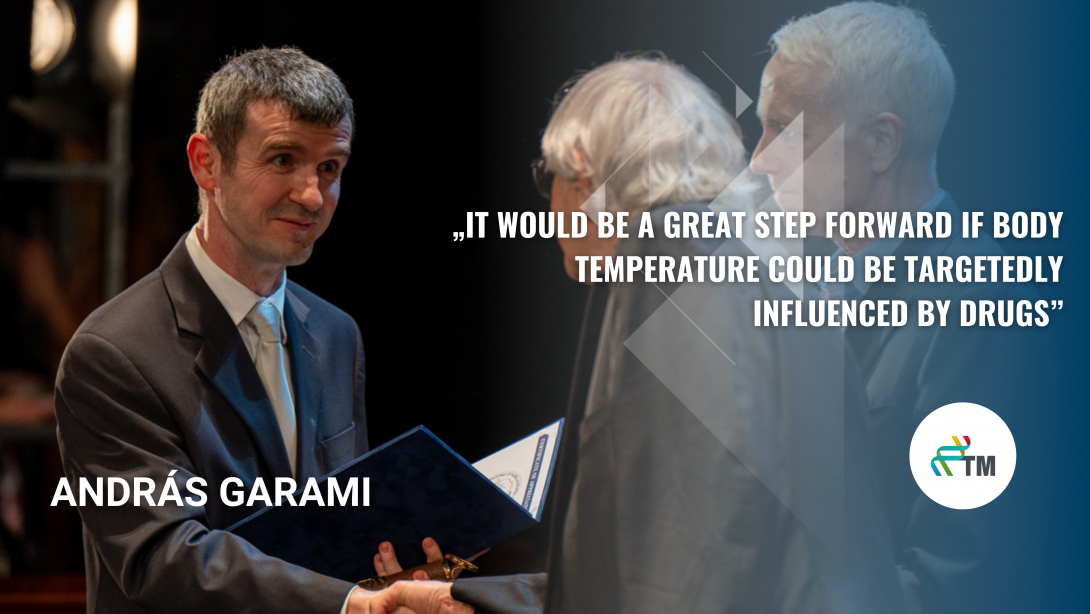
Andras Garami, Head of Department of Thermophysiology, and Associate Professor at Institute for Translational Medicine, Medical School, University of Pecs, defended his thesis for the title of Doctor of the Hungarian Academy of Sciences this March. His dissertation, which dealt with mechanisms of body temperature regulation in health and systemic inflammation, was awarded the maximum score by the Hungarian Academy of Sciences' committee members. The great strength of the research was that Dr. Garami has taken his exploratory research into the clinical field, and his results can help clinicians to save lives.
Dr. Garami's dissertation was the result of nearly 25 years of research, and was defended in March this year under review by a committee of the Hungarian Academy of Sciences. The researcher presented the results of his dissertation, which runs to more than 200 pages, in a 20-minute focused talk. Dr. Garami explored the mechanisms of body temperature regulation in healthy condition and in systemic inflammation. His research has included the study of basic physiological mechanisms, neural structures, and molecular and receptoral mediators involved in thermoregulatory mechanisms. The research has aimed not only to gain a better understanding of the physiology of the thermoregulatory system, but also to identify new diagnostic and prognostic markers, discover drug targets and explore drug development directions. Meta-analyses have also been conducted to translate the results obtained in animal studies to humans. A prospective clinical trial was also conducted.
„I started researching body temperature regulation as a fourth-year medical student in 2002 at the Department of Pathophysiology, Medical School, University of Pecs. The Institute for Translational Medicine developed out from this department. My research topic did not change after graduation; I continued to explore the regulation of body temperature from more and more aspects. As a Ph.D. student, I did research in the United States: I had the opportunity to work in Phoenix, Arizona in the lab of Dr. Andrej Romanovsky, thanks to my former supervisor Prof. Dr. Miklos Szekely. My dedication to become a researcher was strengthened in the US. I obtained my Ph.D. degree after returning home in 2010. I continued scientific work, and after Prof. Dr. Peter Hegyi established the Institute for Translational Medicine, I started to extend my research to the clinical field. The results of our first clinical study were published in 2023. The combination of basic and clinical research was very effective, we achieved some beautiful results.”
Dr Garami's findings can help clinicians in their daily practice. “For example, they can detect one of the predictive biomarkers in sepsis that we have identified. This can be used to diagnose sepsis earlier and start therapy in time. It is also important that with the right diagnosis, clinicians can find the best therapy. This is an important goal of our research: we want to ensure that what we discover and publish is used by clinicians in patient care. It would also be important for doctors to refuse therapies that are not evidence-based.”
The greatest challenge for Dr. Garami in writing his thesis was to bring together 13 years (since Ph.D. degree) of research and many publications. The preparation of the dissertation took more than a year. “One of our most important findings was that we revealed that there are mechanisms involved in the thermoregulatory system not only in the brain, but also in the structures of the peripheral nervous system. The TRPV1 ion channels located there can be influenced by drugs, which gives us great potential to affect the body’s natural temperature regulation in the future. If we could inhibit these receptors with drugs, the body temperature would rise, which would protect against hypothermia during surgery. This has been demonstrated in animal models. It is also possible to develop new drugs that increase the activation of the same TRPV1 receptors and reduce body temperature. These could be used as therapeutic cooling after cardiac arrest or traumatic brain injuries. In such cases, it would be a huge help in reducing mortality. Currently, only physical cooling is available in these cases, which is not always possible. In such situations, drugs would be of enormous help.” Since Dr. Garami has defended the title of Doctor of the Hungarian Academy of Sciences, he wants to use his knowledge as a mentor, helping his younger colleagues and research group to advance scientifically.
(Emese Szabó)